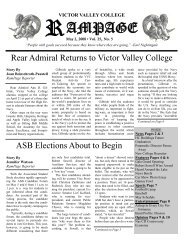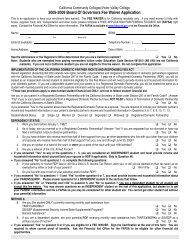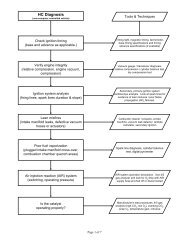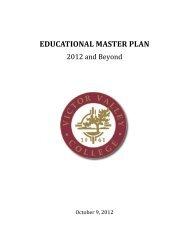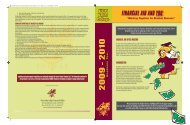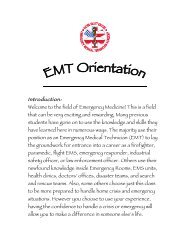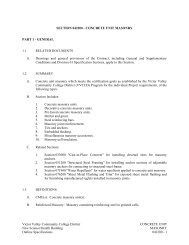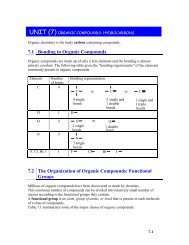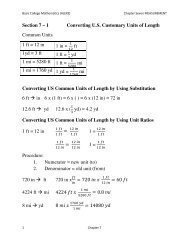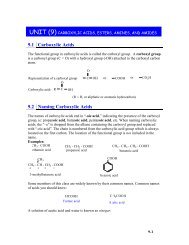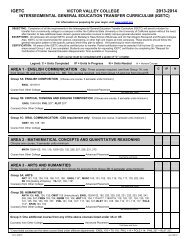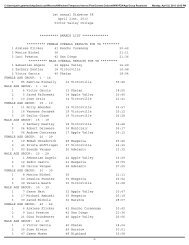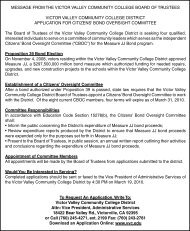Download - Victor Valley College
Download - Victor Valley College
Download - Victor Valley College
Create successful ePaper yourself
Turn your PDF publications into a flip-book with our unique Google optimized e-Paper software.
PROGRAMS / COURSE DESCRIPTION<br />
BIOLOGY COURSES<br />
BIOL 30 MOLECULAR FORENSICS<br />
Units: 0.5 - This course will not apply to the Associate<br />
Degree. 9 hours lecture. (No prerequisite)<br />
This course is designed to meet the need for continuing<br />
education and supplemental forensics training for law<br />
enforcement personnel and educators. Topics will<br />
include the molecular science behind DNA fingerprinting<br />
analysis and serology. Emphasis will be on collection,<br />
recognition, analysis, and evaluation of these forms of<br />
evidence.<br />
BIOL 31 FORENSIC TAPHONOMY<br />
Units: 0.5 - This course will not apply to the Associate<br />
Degree. 9 hours lecture. (No prerequisite. Grade<br />
Option)<br />
Taphonomy is the study of the postmortem process.<br />
Taphonomy incorporates the use of entomology,<br />
pathology, osteology, odontology, animal behavior and<br />
chemistry in order to recover, study and preserve dead<br />
organisms. Reconstruction of the biology and/or ecology<br />
along with circumstances of death is important in<br />
answering questions that pertain to cause, manner and<br />
time since death.<br />
BIOL 52 FORENSIC ENTOMOLOGY<br />
Units: 3.0 – 48-54 hours lecture. (No prerequisite. Grade<br />
Option)<br />
Students will learn some of the various aspects of<br />
forensic entomology. Students will learn basic insect<br />
morphology and how it applies to the forensic field. This<br />
course will also cover the basic forensic collection<br />
techniques, laboratory procedures, analysis of the data,<br />
and how to write a written case report.<br />
BIOL 54 FORENSIC PATHOLOGY<br />
Units: 3.0 - 48-54 hours lecture. (No prerequisite)<br />
This course examines the medico-legal investigation of<br />
death from accidental causes, suicides, homicides,<br />
blunt/sharp force injuries, gunshot wounds, asphyxia<br />
and drowning. The course will cover the identification of<br />
individuals through dental remains and records, as well<br />
as sex, age and race determinations.<br />
BIOL 70 INTRODUCTION TO BIOTECHNOLOGY<br />
Units: 5.0 - 48-54 hours lecture and 96-108 hours<br />
laboratory. (No prerequisite)<br />
This course is designed to introduce students to<br />
concepts of modern molecular biology. The concepts<br />
will be applied as students learn general manipulation of<br />
phage, plant, and bacterial DNA. Students will learn<br />
theory and techniques of PCR, gene cloning, DNA<br />
fingerprinting, restriction analysis, immunoblot analysis<br />
and library construction/screening.<br />
BIOL 71 INTRODUCTION TO LABORATORY<br />
TECHNIQUE<br />
Units: 4.0 - 48-54 hours lecture and 48-54 hours<br />
laboratory. (No prerequisite)<br />
An introduction to laboratory methods for students<br />
interested in a career in a laboratory setting. Emphasis<br />
will be on basic laboratory methods, the principles that<br />
underlie those methods, and the equipment that makes<br />
laboratory work possible. Topics will include laboratory<br />
safety, quality control, regulatory agencies, and will<br />
address problem solving in a laboratory environment.<br />
BIOL 72 BIOMOLECULAR SCIENCE<br />
Units: 3.0 - 48-54 hours lecture. (No prerequisite.<br />
Recommended: BIOL 100 or BIOL 107)<br />
This course is a theoretical approach to laboratory<br />
techniques common to modern biotechnical/clinical<br />
laboratories. Principles of molecular biology, genetics,<br />
metabolism, and immunology will be studied with<br />
emphasis on their application to modern analytical<br />
methods. Information and Communication technology<br />
will be used to develop formal writing and public<br />
speaking skills. See cross listing for CHEM 72.<br />
BIOL 98 A/B COMPARATIVE NATURAL HISTORY<br />
STUDIES<br />
Units: 3.0-4.0 - 16-18 lecture hours plus 96-108 hours<br />
laboratory for each unit. (No prerequisite. Grade Option)<br />
This course offers students the opportunity to learn firsthand<br />
about plants, animals, ecology, geography, and<br />
conservation policies of the trip destination, which is<br />
most frequently a foreign country. Pre-trip lectures will<br />
include slide shows of organisms you may see and<br />
previews of activities and adventures you will<br />
experience on the natural history field trip. Trips vary in<br />
length from 9 days to 2.5 weeks. Biology majors who<br />
wish to participate in a CSU transferable course with<br />
more rigorous course requirements and comprehensive<br />
biodiversity studies may wish to enroll in BIOL 250A,<br />
Ecosystem Field Biology which is offered concurrently.<br />
BIOL 100 GENERAL BIOLOGY<br />
Units: 4.0 - 48-54 hours lecture and 48-54 hours<br />
laboratory. CSU, UC (UC credit limitation). (No<br />
prerequisite)<br />
This is an introductory course with emphasis on the<br />
scientific method, analysis of scientific data, metric<br />
system, current biological problems, cellular biology,<br />
genetics and heredity, classification and systematics,<br />
BIOLOGICAL SCIENCE<br />
2012-2013 <strong>Victor</strong> <strong>Valley</strong> <strong>College</strong> Catalog 135



